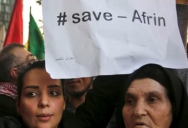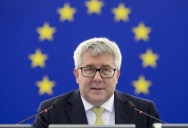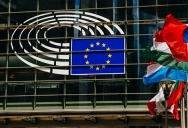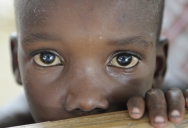S&Ds: International community cannot turn a blind eye to the violence in Afrin; we urge Turkey for a cessation of hostilities now
Parliament votes to remove vice-president Czarnecki after offensive remarks
EUROPABIO AISBL
S&D Group will only support Commission president elected via Spitzenkandidaten process
S&Ds urge Commission to take decisive actions to fight growing inequalities in Europe
- Almost one person in four experiences poverty or social exclusion, and one young
- person in three.
- More than 118.7 million Europeans are at risk of poverty or social exclusion, including 26.9% of children and 17.4% elderly people.
- Income inequality remains at an all-time high, the Gini coefficient on income distribution increased on average from 0.28 in the 1980s to 0.38 in 2016.
- The average income of the poorest 10% is 9½ times lower than that of the richest 10%.
- The 40% of least wealthy households own little over 3% of total wealth, while the 10% of the wealthiest households hold 50%. The extreme concentration of wealth is even more significant to consider, with nearly 40% of total wealth in the hands of the 1% richest Europeans.
- The post-crisis job gaps are closing on average in Europe, but there are still 1.4 million fewer jobs in the EU in 2015 compared with 2007. In addition, the data do not inform on the decency or quality of these jobs.
- Gender gaps in employment and earnings have declined in most countries in the EU, but at 9.8% and 12.8% respectively they persist – and women are still disadvantaged in terms of the type of jobs and occupation they hold.
- There are close links between socio-economic backgrounds and education and health outcomes. Men with lower levels of education have 2.7 years less life expectancy than the better educated, and women, 1.2 years.
- There is a gap in education outcomes among individuals with different parental socio-economic backgrounds. A child from an advantaged socio-economic background will score on average 20% higher in mathematics than a child from a disadvantaged background.
- Low-skilled youth who are disconnected from both employment and learning represent 17% of 15-29 year-olds in the EU, and risk being permanently left behind in the labour market.
- Over the last 20 years, the gap in productivity level between the frontier regions of Europe and the bottom 10% ones increased by 56%.
- Major inequalities remain across countries in terms of overall employment, with unemployment rates reaching 20.7% in Greece versus 3.7% in Germany.
The European Association of Paritarian Institutions
Negotiations in the German Metal industry: IG Metall struck a far-reaching deal in Baden-Württemberg
- A 4.3% plus increase from 01.04.2018, a €100 lump-sum for the months January to March 2018 (apprentices will receive €70), and a collectively agreed supplement of 27.5% of a monthly salary and a fixed amount of €400 from 2019.
- The right to a limited reduction in working hours up to 28 hours for up to 24 months.
- Additional days off for parenting and nursing as well as relief for shift work.
Piri: Human rights situation in Turkey still critical. EU must speak loud and clear
Parliament backs plan to increase up to 32,3 billion EUR of investment in EU’s external actions
S&Ds welcome the strong support of European Parliament for UNRWA
Socialists and Democrats successfully pushed for a new special committee to investigate tax crimes
Modern-day child slavery in Haiti must end, say S&Ds
COCIR and EFOMP partners in training initiative on CT technology and dose optimization
New and familiar faces at acumen public affairs
Acumen is pleased to announce new team hires aimed at consolidating the growing business of the company in various policy areas.
With 10 years of Public Affairs experience on her side Mélanie Yammine joins as Account Manager to help grow the client portfolios in healthcare and environment. Asked about her recent arrival she said: “I am very happy I joined the Acumen team because I highly value their reputation and achievements at Brussels but also global level”.
Mélanie built her expertise working for leading trade associations CEFIC and EFPIA. During her career she has developed a knowledge in healthcare, environment, climate change, food and global health policies and has grown a strong interest in stakeholders’ relations and sustainability challenges. She has participated in many different advocacy campaigns for leading European sectors and has grown a solid know-how in developing public affairs strategies. She has also run communication projects and has become an expert in social media in recent years.
Misachi Ogawa continues at acumen public affairs as a Consultant after his successful traineeship with the company. Misa will run a grassroot global campaign to raise awareness about falsified medicines: www.fightthefakes.org. He is a key member on the team that works with the IFPMA across a wide range of topics including AMR, vaccines. Coming from Germany he recently completed his masters at the London School of Economics and Political Science.
Julia Burkhalter returns to Acumen Public Affairs as Consultant after a completing a trainseeship last summer. A Swiss national, she is currently writing her Master thesis to complete her studies at Sciences Po Paris. Julia gained first work experience in the Brussels bubble when working for the Swiss Business Federation and worked in public affairs consulting back in Switzerland. Julia promises added value to Acumen for clients such as Mitsubishi, Mastercard and Syngenta.
About Acumen
Acumen public affairs was launched in September 2010 and its growing client portfolio includes Cargill Europe, DuPont, European Broadcasting Union (EBU), the International Federation of Pharmaceutical Manufacturers Associations (IFPMA), LEO Pharma, MasterCard, Merial/Boehringer Ingelheim, Mitsubishi, Merck Sharpe & Dohme (MSD), Novartis, Public Libraries 2020, Syngenta, and Uber.
eurelectric President hands over Power Sector Vision to European Commission
Brussels, 8 February 2018– On the occasion of the Power Sector Vision event, eurelectric President and CEO of the Italian energy group Enel Francesco Starace presented Maroš Šefčovič, Vice-President of the European Commission, with the Vision Declaration for the electricity industry in Europe signed by national associations and CEOs of major European power companies.
The new long-term industry vision was first unveiled in December and commits the sector to accelerate the clean energy transition and to achieve carbon-neutral electricity mix in the EU well before mid-century.
“With this vision, the power sector reaffirms its commitment to lead the transition towards a fully sustainable European energy future, while delivering value to customers and to society as a whole.” said Francesco Starace “Our industry sees a great opportunity in the progressive electrification and decarbonisation of Europe’s energy consumption. To achieve such ambitious goals, we will need the support of policy makers to create a stable environment for long-term investments.”
Maroš Šefčovič, Vice-President of the European Commission, in charge of Energy Union welcomed the Vision Declaration and stated: “At the onset of the Energy Union, our objective was to ensure energy security in all Member States. Subsequently, our efforts centred on delivering clean energy. We are now striving for our economies to be powered in this clean, sustainable way. The electricity sector is not only affected by these ongoing 'tectonic' changes, but it is also their driver and enabler. I therefore welcome your clear vision, which includes a carbon-neutral future well before 2050 and boosted electrification of transport. For the Paris Agreement to succeed, we all need to step up a gear."
The eurelectric vision statement commits the industry to enable and sustain a vibrant, competitive European economy - reliably powered by clean, carbon-neutral energy - and a smart, energy efficient and truly sustainable society for all citizens of Europe.
The industry commits to leading a cost-effective energy transition by:
INVESTING in clean power generation and transition-enabling solutions, to reduce emissions and actively pursue efforts to become carbon-neutral well before mid-century, taking into account different starting points and commercial availability of key transition technologies;
TRANSFORMING the energy system to make it more responsive, resilient and efficient. This includes increased use of renewable energy, digitalisation, demand side response and reinforcement of grids so they can function as platforms and enablers for customers, cities and communities;
ACCELERATING the energy transition in other economic sectors by offering competitive electricity as a transformation tool for transport, residential uses as heating and cooking and industry;
EMBEDDING sustainability in all parts of our value chain and take measures to support the transformation of existing assets towards a zero carbon society;
INNOVATING to discover the cutting-edge business models and develop the breakthrough technologies that are indispensable to allow our industry to lead this transition.
eurelectric’s Secretary General, Kristian Ruby, expressed satisfaction that the entire sector stands united against the increasing urgency of climate change, air pollution and depletion of natural resources. “Today, the sector repositions itself to accelerate the energy transition and embed sustainability in all parts of the value chain. We strongly urge policymakers to do their utmost to ensure a fair transition, both socially and geographically, and provide the necessary support and funding to address any socio-economic impacts,” Ruby said.
Along with the new vision, eurelectric also unveiled a new visual identity to complete the transposition and reflect the deep evolution of the industry, which has the ambition to put customers at the centre and lead the energy transition.
To see the new look access: www.eurelectric.org and watch the new eurelectric corporate video.
EMOTA (European e-Commerce and Omni Channel Trade Association)
Cambridge Institute for Sustainability Leadership (Belgium)
Cambridge Institute for Sustainability Leadership (Belgium)
EFPIA
EU-FTAs with Columbia and Peru: Do not treat Human Rights and Rural Exodus as a minor matter
Brussels/Bogotá/Lima, 12 February 2018
Yesterday (Sunday) Helmut Scholz (DIE LINKE.), Member of the European Parliament and GUE/NGL’s coordinator for trade policy, traveled first to Colombia, and continues to Peru on Wednesday. The focus of the official EP-delegation of the EP Trade Committee INTA, lies on the EU's comprehensive trade agreement with Colombia and Peru, to which Ecuador joined recently. The EP Trade Committee is responsible for monitoring the implementation of trade agreements. As the trade expert of the EP left group, Helmut Scholz commented ahead of the journey:
"In this still very young year 2018, already 27 trade unionists and human rights activists have been murdered in Colombia. This is an incredible number that cannot be accepted, which is why the question of human rights will be at the core of our observations. The official delegation of the EP Trade Committee will hold its first talks in Bogotá as well as a few days later in Lima with representatives of civil society: What is the situation like for the trade unions and the environmental organizations in the two countries? Will the roadmap agreed upon with the EU on implementing safeguard measures and improving the human rights situation be respected or will the agreement be broken? I will address my questions also to the respective ministers of the Colombian government."
"Further, I will urge that small farmers will be integrated into the meetings of the EP delegation with representatives of the agricultural sector, since their livelihoods under the agreement with the EU - which was concluded at the same time as that with the US - faces particularly intense competition. The social and environmental consequences of the trade agreement will also play an essential role in our discussions with the foreign ministries of the two countries and, above all, in discussions with Juan Manuel Santos, the President of Colombia, and Pedro Pablo Kuczynski, the President of Peru. Further information is expected from meetings with representatives of the Externado University and representatives of the Colombian Congress."
"I will also have bilateral meetings for an exchange of views on the assessment of the peace process, including with Rodruigo Revera, Colombia's High Representative for Peace.
Please find the program of the five-day trip (until 16 February) attached. Helmut Scholz will be back in Brussels on 19 February and will be available for further questions.
Contact
Office of Helmut Scholz
Member of the European Parliament
0032 228 45893
helmut.scholz@ep.europa.eu
helmutscholz.eu
@HelmutScholzMEP
DIE LINKE. in the European Parliament
Contact Press:
Karim Khattab
+32 228 43 086
+32 470 64 80 58 (Belgium)
+49 151 72 82 56 40 (Germany)
European United Left / Nordic Green Left
European Parliamentary Group
www.dielinke-europa.eu
@khk_EU



















